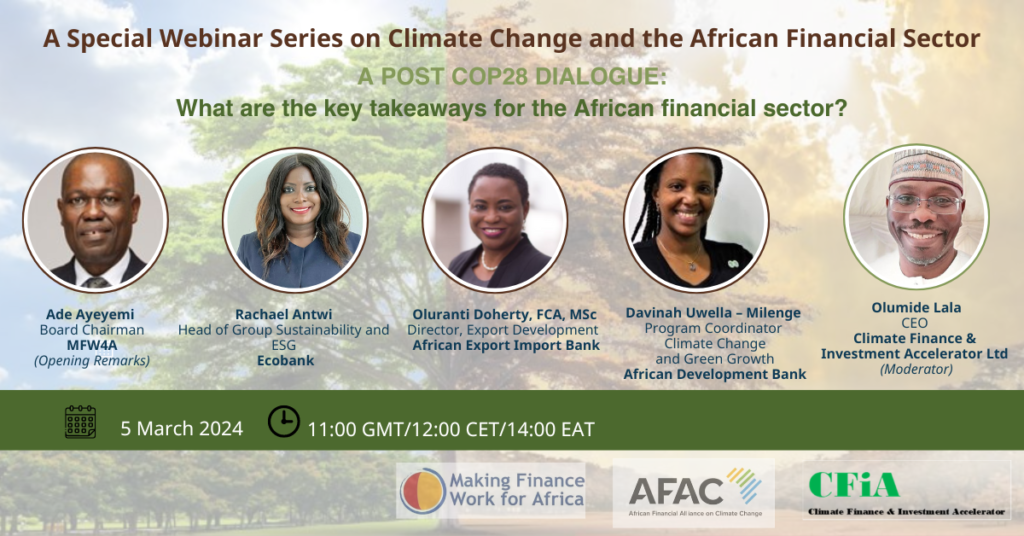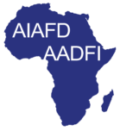A post-COP28 dialogue: What are the key takeaways for the African financial sector?

As part of the successful webinar series on climate change that MFW4A started in 2023, this webinar, held on 5 March, was the first of 2024 and 290 people attended.
The key question running through all the discussions was: What can the African financial sector do to attract and operationalize more finance for addressing climate change on the continent.
Presenting the background to the webinar, Mr. Ade Ayeyemi, MFW4A Board Chairman, stressed the importance of a focused approach on the part of the African financial sector to developing coherent and actionable strategies for addressing climagte change, whether these relate to funding, financing mechanisms or developing collaborative partnerships. Dealing with climate change is more about the power of policy, innovation, and finance. He ended with the call for Africa to be a navigator and not just a passenger on the ‘climate change journey’, that it does this with sense of urgency and that the financial sector embrace the transformative role that it has the potential to play in building a sustainable future in Africa.
Mr. Olamide stressed that it was noted at COP28 that the key challenges in Africa for climate change are loss and damage, access to finance for adaptation, and food and energy security. It was noted that there is a huge gap between funds pledged for Africa to address climate and the actual amount needed. It is estimated that US$ 430 billion US will be needed by 2030. Developed countries are urged to contribute to the financing needs. There is enormous untapped potential in Africa’s capital markets. The relatively low levels of investment in sustainable and green bonds in African markets suggest that there need to be more concerted efforts by the financial sector to attract these funds and makes sure that they are correctly distributed.
Ms. Antwi spoke about successful products that Ecobank has developed – such as a USS$ 350-million linked loan, which allowed the provision of finance to climate change projects in 33 countries. See press release. The bank then developed a stronger sustainable finance framework which includes green, social or sustainability related transactions.
Ms. Doherty addressed the question of the role that multilateral institutions and DFIs can play over and above the commitments made to mobilizing finance at COP28. For example, US$700 million has been pledged for climate change related loss and damage in developing countries, particularly the most vulnerable countries, which are mostly in Africa. But us much as US$366 billion are estimated to be needed to fund adaptation initiatives. She stressed energy and food security issues as being paramount – because of high levels of drought, desertification and loss of biodiversity. And sometimes there are not sufficient instruments for facilitating the transfer of pledged funds. Resources are also needed for creating partnerships and capacity building.
DFIs are crucial, as they are currently contributing about 53% of the finance earmarked for sustainability and climate change initiatives. African governments contribute 23%, bilateral agents 16%, and the financial sector represents a very small percentage at about 3%. There’s clearly a huge need for more private sector funding. DFIs play a crucial role in channeling and attracting private finance. Afreximbank has made concerted efforts to finance food and energy projects and to get funds mobilized in these markets. These efforts include a Project preparation facility, the Liquidity Sustainability facility et the Fund for Export Development in Africa.
Ms. Uwella-Milenge spoke about what the recently launched African Financial Alliance on climate change (AFAC) can do to ensure that all the most affected countries are heard and represented in all climate finance discussions and decision-making. She said the sector needs correct the risk profile in Africa, which is exaggeratedly high, and articulate and showcase the many opportunities that there are for sustainable investment.
While a significant amount of finance was pledged for green infrastructure projects in Africa, the panelists also pointed out the importance of resolving regulatory and policy issues that could obstruct financing and the smooth running of projects.
Ms. Marina Finken, Coordinator of MFW4A, closed the webinar, saluting the efforts of the organizations and underscoring the importance of highlighting the existing initiatives to foster peer-to-peer learning and collaboration.